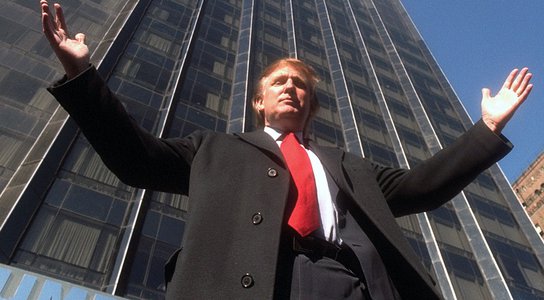On March 28, 2019, David Bernhardt – former energy and natural resource lobbyist – testified at a Senate hearing on his nomination to be Secretary of the Interior Department.
When
testifying before the Senate Committee on Energy and Natural Resources on March 28 2019, Bernhardt will be required to tell the truth. And Senators should
ensure they get the whole truth, because Bernhardt may have misled Congress the
last time he faced confirmation for another position.
In 2017, when up for the post of Interior Department Deputy Secretary, Bernhardt said he had not engaged in lobbying activities for Access Industries, a company owned by oligarch Leonard Blavatnik. Evidence collected by Global Witness suggests he may well have done so.
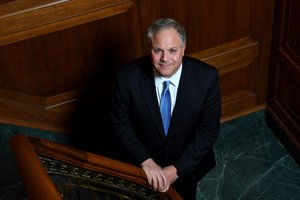
Why were David Bernhardt’s lobbying records changed?
Credit: Getty Images/The Washington Post
Blavatnik is a controversial character in Washington. He co-owns Russian aluminum producer RUSAL with oligarchs Viktor Vekselberg and Oleg Deripaska; the company, Vekselberg and Deripaska have been the subject of U.S. sanctions. He also caught the eye of Special Counsel Robert Mueller’s Russia investigation when, in 2017, Trump’s Inaugural Committee revealed a $1 million payment from Blavatnik’s company Access Industries.
In 2011 and 2012, Bernhardt was on record as a lobbyist for Access. However, in April 2017 – one week after Access’ $1 million payment was published and two days before Trump formally nominated him to be Deputy Secretary Congressional records listing Bernhardt as an Access lobbyist were changed. His old law firm, Brownstein Hyatt Farber Schreck (BHFS), removed Bernhardt’s name from all lists of lobbyists on the Access lobbying disclosure forms it had previously submitted to Congress. Three weeks later he was due to testify before Congress for his confirmation hearing.
Responding to a Senate questionnaire in May 2017, Bernhardt wrote that his reports were changed because he was not involved in “lobbying activities” for Access.
Under
U.S. law, “lobbying activity” means
contacting government officials or supporting other lobbyists for a client.
Someone can undertake lobbying activities, however, and not need to register
with Congress as a lobbyist. A person only needs to register when lobbying
activities take up 20 percent of their time and they contact officials
themselves.
Global
Witness does not have evidence that Bernhardt should have registered as a
lobbyist for Access.
However,
Global Witness has uncovered evidence suggesting that Bernhardt may have engaged
in lobbying activities for Access and may have misled Congress when saying he
did not:
- Of the BHFS lobbyists on the Access account, Bernhardt was the leading expert working on many of the topics Access wanted addressed, including “energy” and “natural resources.” BHFS originally reported that Bernhardt was a lobbyist for Access on these issues. At the time, Bernhardt was a member of both the firm’s Energy Department and its Natural Resources Department and would ultimately head BHFS’ Energy, Environment, and Resource Strategies Department. None of BHFS’ other Access lobbyists had the same expertise: they were not members of the relevant departments, and some had clients as diverse as the Girl Scouts and the Ultimate Fighting Championship.
- It is unlikely that BHFS’ initial Access lobbying reports were all wrong, and suddenly required correction up to six years after submission. In 2011 and 2012, BHFS filed multiple reports identifying Bernhardt as a lobbyist for Access, submitting them well after the reporting period. In 2012, the firm even filed an amendment to the last of these reports saying Bernhardt had stopped lobbying for Access, but did not file amendments saying its previous reports identifying Bernhardt as a lobbyist were wrong.
In
March 2019, Global Witness asked Bernhardt, BHFS, and Access whether
Bernhardt’s records were changed because of Access’ Inauguration payment.
Bernhardt and BHFS did not respond. Access responded only that Blavatnik’s
political donations were legal and aimed to promote pro-business and
pro-Israeli policies.
Yet it stretches credulity that a top firm failed to bring its A-game when representing a company owned by one of the world’s richest men. Bernhardt may not have lobbied directly for Access, but it is hard to believe that such a veteran expert did not spend time overseeing – or at least supporting – less experienced lobbyists. The latter would constitute lobbying activities under the law.
It is also not credible that BHFS would have filed so many mistaken reports for Bernhardt who, as a partner and shareholder, was one of the firm’s most powerful lawyers.
Bernhardt will soon return to the Senate Energy and Natural Resources Committee for another confirmation hearing. This time Senators should do a better job than they did in 2017. They should ask whether Bernhardt did any work for Access Industries and why his firm’s lobbying reports were amended. Bernhardt should also answer whether he misled Congress in 2017 when he said that he engaged in no lobbying activities for Access.
The House of Representatives recently passed the For the People Act – more commonly known as H.R.1. The Act restricts the size of inauguration payments, requires them to be disclosed promptly, and bars companies and foreign nationals from making payments. The Act also greatly improves reporting requirements for people undertaking lobbying activities and promotes ethical behavior by Administration officials by strengthening the enforcement powers of the Office Government Ethics. It is now time for the Senate to also pass the For the People Act.
DAVID BERNHARDT, CARD-CARRYING LOBBYIST
Bernhardt, who currently serves as acting Interior Secretary, has been nominated by President Donald Trump to assume the post permanently. It is a powerful job: the Interior Department manages vast swathes of federally-owned land and ocean and is a key regulator of oil, gas, and mining licenses. Up to now, Bernhardt has served on Trump’s 2016 transition team and as Deputy Secretary – a position for which he was confirmed in July 2017.
If he becomes Secretary, Bernhardt would replace Ryan Zinke, who left Interior in January 2019 following a series of scandals. These included a conflict of interest investigation involving Zinke, Halliburton’s chairperson, and an as-yet-unbuilt brewpub.
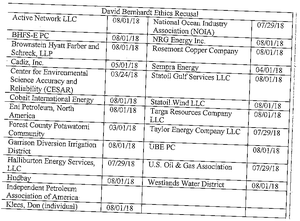
Bernhardt’s conflict card, reminding him how many old clients he has to avoid. Credit: Western Values Project
Bernhardt himself does not come to the job free from conflicts. He previously served in the Interior Department from 2001 to 2009. But between 1998 and 2001, and again between 2009 and 2017, he worked with the lobbying and law firm Brownstein Hyatt Farber Schreck (BHFS). During his latter stint at BHFS, Bernhardt was a partner and shareholder in the firm and worked for a long list of oil and mining companies, including Halliburton, the Independent Petroleum Association of America, U.S. Oil and Gas Association, and Rosemont Copper.
As Deputy Secretary, Bernhardt is legally barred from helping some of his former clients. To help him remember the companies he cannot work with, Bernhardt carries around a note card listing these clients.
ACCESS INDUSTRIES, THE OLIGARCHS, AND A $1 MILLION TRUMP INAUGURATION PAYMENT
There is, however, one company for which Bernhardt was registered as a lobbyist that is not included on his conflict card: Access Industries.
Access is an umbrella entity with “significant investments” in companies like chemical giant LyondellBasell, power plant operator Calpine, and Warner Music. It is majority owned by colorful, Soviet-born oligarch Leonard Blavatnik.
According to Forbes, Blavatnik is the 59th richest man in the world. He has both U.S. and U.K. citizenship, and has not only an Oxford graduate school but also a wing of London’s Tate Modern museum named in his honor.
But Blavatnik also has problematic Russian business associates. He co-owns Russian aluminum producer RUSAL with oligarchs Viktor Vekselberg and Oleg Deripaska. Both Vekselberg and Deripaska have been included in the Treasury Department’s “Putin List” of Russians who are close to the Kremlin or are very rich. In April 2018, Treasury sanctioned RUSAL, Vekselberg, and Deripaska (but not Blavatnik) – partly in retaliation for Russia’s attempts “to subvert Western democracies.” Sanctions against RUSAL were lifted in early 2019 despite opposition from congressional Democrats. As individuals, Deripaska and Vekselberg remain under sanction.These Russian ties appear to have piqued the interest of Special Counsel Robert Mueller’s Russia investigation. As an American citizen, Blavatnik can donate to American politicians, and over the years he has contributed to Republicans and Democrats alike. However, in December 2016 Access shot to the top of Trump’s benefactor list by paying $1 million to the President’s Inaugural Committee.
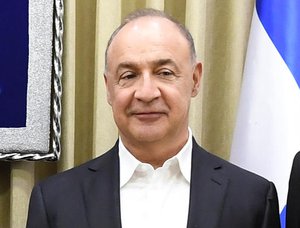
Oligarch Leonard Blavatnik controls Access and has problematic Russian business partners.
Credit: Mark Neyman
This payment apparently bought Blavatnik a place at Inauguration meals, including an exclusive “Candlelight Dinner.” Vekselberg, who is not a U.S. citizen and therefore cannot contribute to politicians, was also at the “Candlelight Dinner.” It is unclear why Vekselberg was invited to the meal. Vekselberg’s cousin – Andrew Intrater – paid $250,000 to the Inaugural Committee, and Vekselberg and Intrater also sat at the table of then-Trump lawyer Michael Cohen. Between January and August 2017, Intrater’s company transferred $500,000 to Cohen’s company as part of a $1 million consultancy deal.
Mueller investigators reportedly questioned witnesses about Access’ Trump Inauguration payment, including the “timing of contributions coming from US citizens with ties to Russia.” According to the New York Times, in 2018 Vekselberg was questioned and searched at a New York airport by Mueller’s agents. And in February 2019, federal prosecutors subpoenaed the Inaugural Committee, asking whether it had received any illegal donations from non-citizens.
It is not known whether Access’ payment was a subject of either the 2018 Vekselberg questioning or the 2019 subpoena. When asked for comment in March 2019, a spokesperson for Access stated:
“As an American citizen, Mr. Blavatnik has the legal right to make contributions to any political party or candidate. Motivated only by a desire to further a pro-business, pro-Israel agenda, his donations are a matter of public record and comply with all legal requirements.”
AT FIRST, BHFS REPORTED BERNHARDT WAS AN ACCESS LOBBYIST
When Access contributed to Trump’s Inauguration, the company was still a client of BHFS, and Bernhardt was still a partner and shareholder in the firm. Access hired BHFS between 2011 and 2017 to lobby Congress on topics including taxation of foreign companies and environmental regulation. In 2011 and 2012, the firm reported to Congress that one of the people lobbying for Access was David Bernhardt.
That Bernhardt was on record as an Access lobbyist makes sense. In 2011 and 2012, BHFS reported that eight staffers were lobbyists for Access, together netting the firm $360,000. As will be described below, of these lobbyists, Bernhardt was the leading expert on natural resources and energy issues. At the time, BHFS was lobbying Congress on “taxation,” “energy,” “natural resources,” “business and intellectual property,” and a sweeping bill – H.R. 2401 – that aimed to reduce environmental regulations.
THEN BHFS CHANGED ITS MIND
In April 2017, two days before he was nominated as Deputy Secretary by Trump, BHFS changed Access’ lobbying records and Bernhardt’s name was removed. Records for the seven other lobbyists on the Access account were not changed.
According to Bernhardt, his records were amended because he was not involved in his firm’s lobbying activities for Access. A May 2017 Senate questionnaire asked Bernhardt to “describe any lobbying activity that you have performed during the past 10 years."An excerpt of his response is below, with emphasis added by Global Witness:
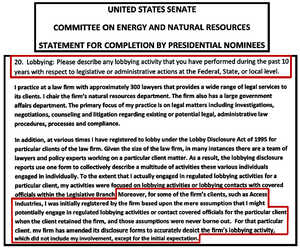
In the same questionnaire, Bernhardt also did not include Access in a list of companies to which he had provided “services” worth at least $5,000 between May 2012 and May 2017.
Bernhardt’s answers to the Senate questionnaire are worded very carefully. It is possible that he is denying that he engaged in sufficient lobbying activities to warrant being registered as a lobbyist for Access. This would mean that he did not spend 20 percent or more of his time working for Access on lobbying activities as defined by the law but allowing that, he may have engaged in activities below the 20 percent threshold. Bernhardt also could have provided $5,000 in services for Access – just not after April 2012.
The Lobbying Disclosure Act (LDA) is a U.S. law that aims to increase accountability around federal lobbying practices by requiring disclosure of lobbying activities to influence the federal government.
Under the LDA, a lobbying firm must register a client with Congress if it receives $3,000 from that client in a quarter. An individual must register as a lobbyist for a client if, in a quarter, they spend 20 percent of their time on "lobbying activities" and make more than one "lobbying contact" with a "covered official" for that client.
“Lobbying activities” are defined as both contacting covered officials on behalf of a client and efforts in support of such contacts. This includes preparation and planning, as well as research and other background work that is intended for use in lobbying contacts. It also includes supporting others who are lobbying and coordination with the lobbying activities of people or organizations.
A “lobbying contact” is a communication seeking to influence legislation, nominations, regulations, or other government programs and policies. “Covered officials” include members of Congress, their staff, and senior Administration officials.
Of course, an individual can undertake lobbying activities and not need to register as a lobbyist –either by engaging in lobbying activities for less than 20 percent of their time, or by not contacting covered officials.
Congress has the opportunity to fix this problem through the For the People Act. The Act, recently passed by the House of Representatives, requires more people undertaking lobbying activities, including supporting other lobbyists, to register as lobbyists.
But the clear implication of Bernhardt’s answers – the one drawn by a reasonable reader – is that he did not undertake lobbying activities for Access at all, including supporting other BHFS staffers with their Access lobbying. The questionnaire asked Bernhardt to “describe any lobbying activity” over the past 10 years. In response, Bernhardt stated that he did not contact “covered officials” on behalf of Access, that “the firm’s lobbying activity” on behalf of Access “did not include my involvement”, and that records saying otherwise were wrong.
The Department of Interior has confirmed this. In April 2018, a Department spokesperson addressed the issue in response to a question from Vice News:
“Mr. Bernhardt never lobbied for Access Industries and he addressed this issue in his paperwork that was submitted to the Senate.”
EVIDENCE BERNHARDT MAY HAVE ENGAGED IN LOBBYING ACTIVITIES FOR ACCESS
Evidence uncovered by Global Witness suggests that Bernhardt may have engaged in lobbying activities for Access in some capacity, contrary to what he has stated.
First, of the BHFS lobbyists working on the Access account, Bernhardt was the leading expert on many of the issues for which Access had hired the firm to lobby. In 2011 and 2012, BHFS repeatedly represented Access on the issues of “energy,” “natural resources,” and the anti-environmental regulation bill H.R. 2401. During this period, Bernhardt’s lobbying focused almost exclusively on energy and natural resources clients, including Cobalt International Energy, Rosemont Copper, and Samson Resources.
In 2011 and 2012, Bernhardt was also a key member of both BHFS’ Energy Department and its Natural Resources Department, according to archived pages from the firm’s website. Bernhardt was so important to these practices that in 2013 he headed BHFS’ Energy, Environment, and Resource Strategies Department. Bernhardt’s BHFS biography from the time emphasizes his qualifications.“David provides comprehensive strategic counseling to a wide range of corporate and government entities. He advises clients on issues originating from Capitol Hill, the White House, Federal administrative agencies and the courts, with special emphasis on issues and transactions related to environmental, energy and natural resource matters. He also represents clients in regulatory enforcement proceedings, environmental and permitting reviews and in adjudications.”
Bernhardt appears to have been the only person with such expertise out of the eight lobbyists on Access’ account.
Three of the lobbyists on Access’ account were not energy or natural resource specialists, according to lobbying reports filed at the time. They did not work on the topics for any other clients, instead focusing on finance, intellectual property, or online gambling for outfits like the Ultimate Fighting Championship or the casino company Caesars.
Four of Access’ lobbyists did work on energy or natural resources topics for others, but with nowhere near the same focus as Bernhardt. Two did not lobby on the anti-environmental regulation bill H.R. 2401 for other clients. The other two – Judy Black and Michael Levy – did lobby for other clients on the bill, but were also generalists who worked on a large range of topics for a large number of clients. These “Policy Directors” worked on issues ranging from healthcare to rum taxes, representing clients as diverse as the Girl Scouts and Sentrillion– a private security contractor that works with the Customs and Border Patrol.
And unlike Bernhardt, none of the other lobbyists on Access’ account were members of either BHFS’ Energy Department or its Natural Resources Department.
Second, it is unlikely that BHFS would have
gotten it so wrong. Between 2011 and 2012, the firm submitted five quarterly
reports for Access that included Bernhardt’s name. These reports stated that
Bernhardt had “acted as a lobbyist” for the company. The forms did not specify, as Bernhardt suggested in his
answers to the 2017 Senate questionnaire, that he “might potentially” lobby.
Each lobbying report was filed one month after the reporting period had finished (as the law allows), giving BHFS ample time to determine if their record keeping was correct. Indeed, in September 2012 the firm did determine that one of its records was wrong and filed an amendment to say that Bernhardt did not lobby for Access after June 2012. At this time, however, the firm did not change other disclosure forms that listed Bernhardt as a registered lobbyist for Access between May 2011 and June 2012.
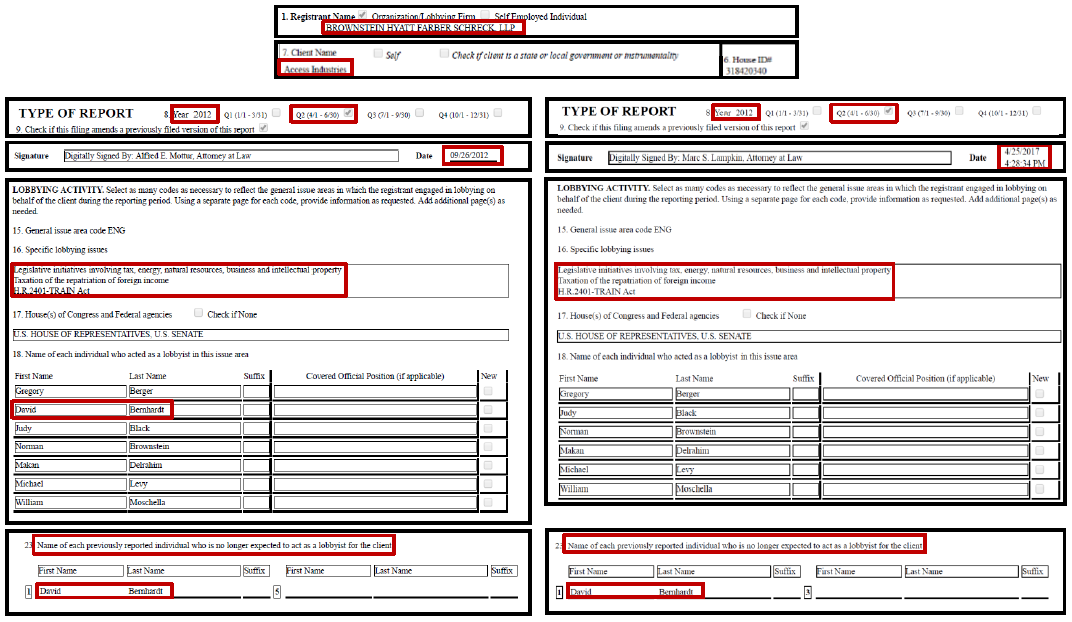
In 2011 and 2012, BHFS reported Bernhardt lobbied for Access. In 2012, BHFS even amended one report to say Bernhardt would not lobby in the future but still listed him as a past lobbyist. However, in 2017, BHFS amended all its reports saying Bernhardt had not lobbied for Access at any point.
BERNHARDT AND ACCESS’ $1 MILLION TRUMP INAUGURATION PAYMENT
If Bernhardt was engaged in lobbying activities for Access, why did he tell the Senate Energy and Natural Resources Committee he had not? One possible explanation is Blavatnik.
In the spring of 2017, Bernhardt was preparing to be nominated as Deputy Secretary of the Interior Department. At the same time, on April 18, the Federal Election Commission published a list of payments that the Trump Inaugural Committee had received. This list included the $1 million payment made by Access to the Inaugural Committee. One week later, on April 25 and 26, BHFS amended Bernhardt’s Access records saying he had not lobbied for the company. Two days later, Trump officially nominated Bernhardt as Deputy Secretary.
This timing suggests that BHFS may have changed Bernhardt’s Access lobbying records because he did not want to be associated with Blavatnik at a time when the oligarch could be a political liability. In early 2017, it was widely reported that the FBI was investigating Russian ties to President Trump, although investigations into Inauguration payments specifically were not reported until later in the year. It would appear politically astute that, preparing for a Senate confirmation hearing, Bernhardt would want to distance himself from an oligarch’s large payment to the Trump Inaugural Committee – especially an oligarch with business partners linked to the Kremlin.
Global Witness requested comment from Bernhardt
and BHFS about whether Access’ $1 million Inauguration payment influenced the
decision to change Bernhardt’s lobbying records. We received no response.
David Bernhardt’s issues with record keeping are well documented, and BHFS’ changed lobbying records are not the only time his relationship with old clients has come under scrutiny. While with BHFS, Bernhardt was on record as a lobbyist with Westlands Water District – a Californian utility company – and during his May 2017 Senate testimony Bernhardt said that he had “not engaged in regulated lobbying activity” for the company after November 2016. This was called into question after emails were published showing continued and frequent consultation with Westlands, including agreement to join call a with members of Congress, up to April 19 2017.
In February 2019, the New York Times also reported that, as Deputy Secretary, Bernhardt directed staff to ease environmental regulations that would “disproportionately benefit” Westlands Water District – a company he represented at BHFS. He received “verbal clearance” from Interior ethics officials, although other ethics experts have questioned whether this was the correct procedure.
Bernhardt has also employed some questionable record keeping while at the Interior Department. His calendars contain entries with minimalist descriptions such as multiple appointments just called “External Meeting.” In one case reported by the investigative NGO Documented, an event scheduled as “Meeting to Discuss Energy Issues” turned out to be a get-together with the CEO of the American Petroleum Institute. And when investigating the mysterious “reassignment” of Interior staff working on climate change and conservation, the Department’s Inspector General found that there were not enough records to allow for a thorough investigation. In response, Bernhardt defended the process and said it had been lawful.This opacity may only get worse. In December, the Department issued a new proposed rule for how it would respond to Freedom of Information requests, stating it “will not honor a request that requires an unreasonably burdensome search.”
Yet the federal government’s Office of Government Ethics currently has only limited powers to investigate ethics concerns raised by activities of Bernhardt and other officials. Fortunately, Congress is trying to fix this with the For the People Act, which includes provisions granting the Office subpoena powers so it can conduct better investigations. In March 2019, the House of Representatives passed the For the People Act. The Senate should now do the same.
WAS BERNHARDT CANDID WITH CONGRESS?
Global Witness does not have evidence that Bernhardt was the subject of Justice Department investigations into relationships between Trump and Russia. There also is no evidence that he was aware of Access’ $1 million payment to the Trump Inauguration, although Bernhardt did serve on Trump’s transition team, Access was a client of BHFS, and Bernhardt was a BHFS partner around the time of the payment.
However, Global Witness does believe there is sufficient evidence to ask whether Bernhardt misled Congress. His answers to the Senate’s May 2017 questionnaire clearly state that he was not involved in any of the firm’s lobbying activity on behalf of Access. However, the evidence suggests that Bernhardt may have engaged in lobbying activities for Access: he was a leading BHFS expert on many of the topics Access wanted the firm to work on and it is unlikely that BHFS would have made so many mistakes when reporting Bernhardt’s lobbying.
The timing is uncanny: Bernhardt’s lobbying records were changed just after Access’ $1 million Trump Inaugural payment was published and just two days before he was nominated as Deputy Secretary by Trump, suggesting he may have wanted to distance himself from the oligarch’s company.
Bernhardt’s upcoming Senate confirmation hearing should determine whether Bernhardt did lobby for Access and why BHFS changed his lobbying records to remove any work. Senators at this hearing should also ask whether Bernhardt was sufficiently candid in 2017 when he stated that he was not involved in any of his firm’s lobbying activity for Access.
At the same time, Congress should act to ensure future presidential inauguration payments are better regulated. Passing H.R. 1, the For the People Act, would represent a step forward. The Act restricts the size of inauguration payments, requires them to be disclosed promptly, and bars companies and foreign nationals from making payments. It also improves lobbying reporting rules, requiring people to report if they support other lobbyists and if they spend ten percent (as opposed to the current 20 percent) of their time on lobbying activities for a client. The Act also strengthens the Office of Government Ethics so it has the power to tackle ethics issues across the Administration.
The House of Representatives recently passed the For the People Act. The Senate should now do the same.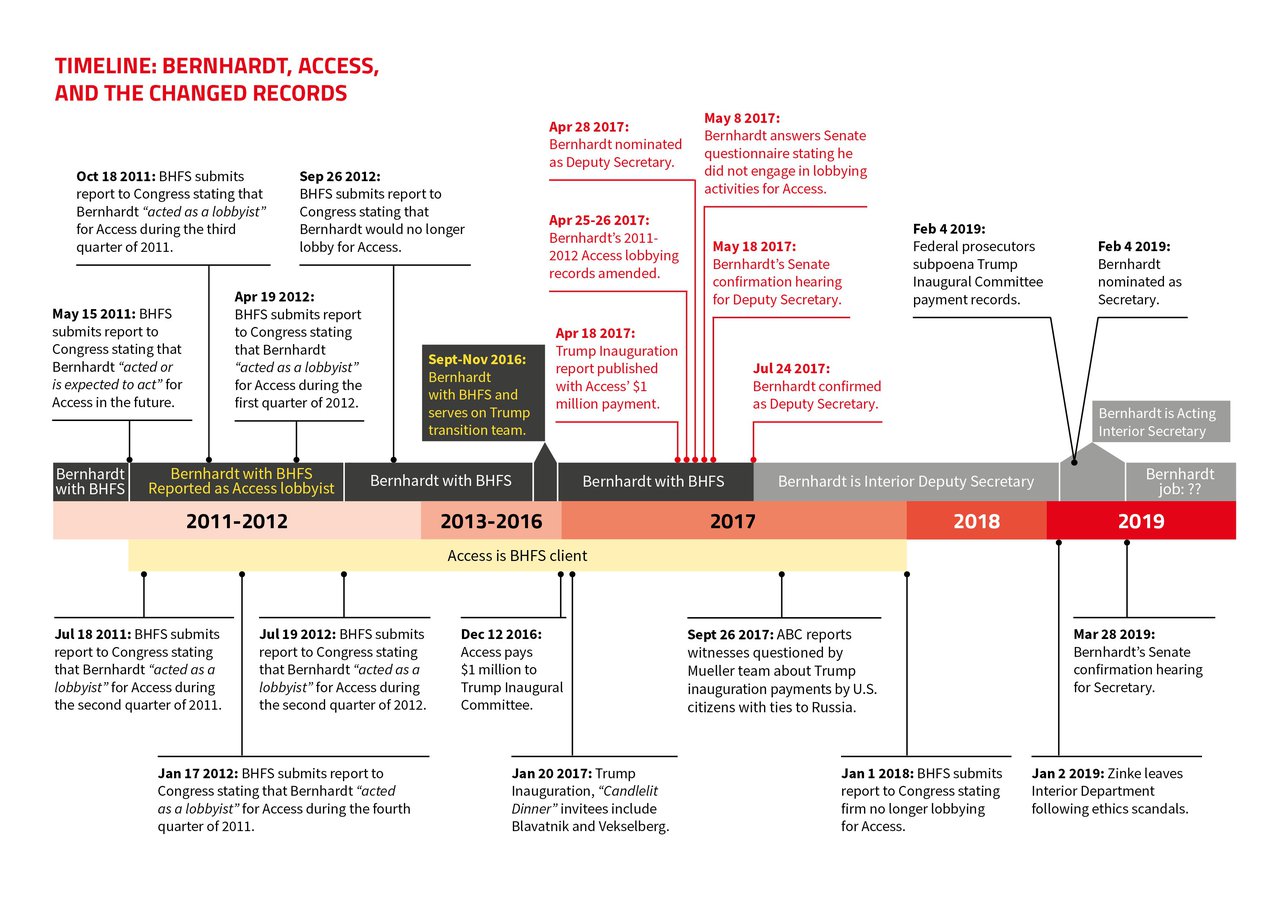
You might also like
-
Article The Real Comb Over: Susan Combs, oil money, and the dismantling of a U.S. Agency
America’s top agency regulating oil and gas extraction risks being gutted by a Trump appointee who received up to $2.1 million from oil companies.
-
Blog post A Conflicted President: When American foreign policy is up for sale
How Donald Trump is benefiting from the US presidency and why this has major implications for US foreign policy.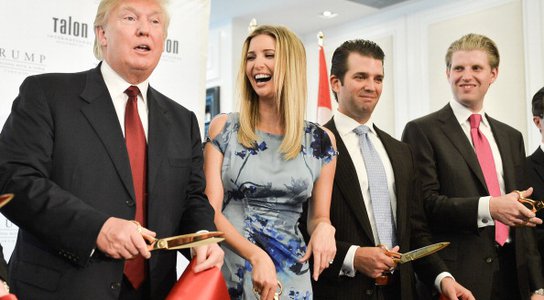
-
Campaign Hub Exposing Trump's Deals
Our investigations into Donald Trump’s business deals have exposed corruption, conflicts of interests and money laundering red flags